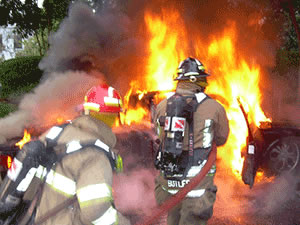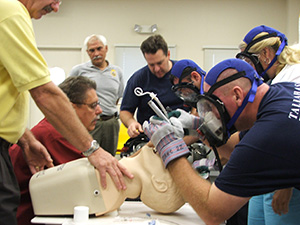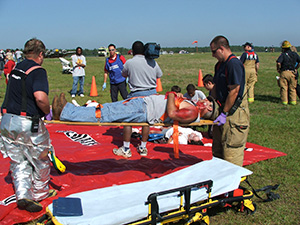Training
Training is instrumental in the development and advancement of Fire Suppression & Rescue personnel, and our curriculum places an emphasis on customer service and professional fire service advancement. TFD achieves this by coordinating and delivering in-service training through practical skills activities, classroom course delivery and online curriculum. The training grounds consists of:
- 6 story multi-use training tower
- 2.5 story Class “A” burn facility
- Natural gas and propane burn station
- Regional Hazardous Material and Urban Search & Rescue training station.
Fire Suppression and Rescue
 The Tallahassee Fire Department responds to nearly 400 structures fires, both commercial and residential, as well as approximately 200 vehicles fires, over 900 brush and rubbish fires, and more than 1100 vehicle rescues annually. As a result of the diversity of emergency calls, personnel must be properly equipped, trained, and at the ready to respond and mitigate any of these emergency situations. Beyond Leon County, the department also provides emergency response via mutual aid to communities in the surrounding area.
The Tallahassee Fire Department responds to nearly 400 structures fires, both commercial and residential, as well as approximately 200 vehicles fires, over 900 brush and rubbish fires, and more than 1100 vehicle rescues annually. As a result of the diversity of emergency calls, personnel must be properly equipped, trained, and at the ready to respond and mitigate any of these emergency situations. Beyond Leon County, the department also provides emergency response via mutual aid to communities in the surrounding area.
Citizens' Fire Academy
 Wonder what it would be like to be a firefighter? Well now you can find out. The Department's Citizens' Fire Academy delivered twice annually, is an informative learning process that provides an opportunity for you to receive 5 weeks of classroom and field instruction regarding the various responsibilities held by firefighters. While attending, you will receive information and instruction on issues such as vehicle extrication, Liquid Propane (LP) Gas Fires, Fire Hose Deployment, Fire Attack, Fire Ventilation, Safety, Communications, Airport Fire Operations, Hazardous Materials, Vertical Rescue, Emergency Medical Procedures, and much more. All of this is enhanced by your opportunity to ride along with a company, rappel with a TRT member, and extinguish a Liquid Propane Gas Fire. The Academy is free.
Wonder what it would be like to be a firefighter? Well now you can find out. The Department's Citizens' Fire Academy delivered twice annually, is an informative learning process that provides an opportunity for you to receive 5 weeks of classroom and field instruction regarding the various responsibilities held by firefighters. While attending, you will receive information and instruction on issues such as vehicle extrication, Liquid Propane (LP) Gas Fires, Fire Hose Deployment, Fire Attack, Fire Ventilation, Safety, Communications, Airport Fire Operations, Hazardous Materials, Vertical Rescue, Emergency Medical Procedures, and much more. All of this is enhanced by your opportunity to ride along with a company, rappel with a TRT member, and extinguish a Liquid Propane Gas Fire. The Academy is free.
EMS Programs - Community Involvement
To help promote good health habits and to prevent potentially serious illness, the Fire Department offers free blood pressure screening to you as a public service at all 16 fire stations located throughout Leon County. In addition to the free blood pressure check, you are given a card which maintains a record of your blood pressure readings. You are encouraged to take this card with you on visits to your physician for review. Learn more about lowering your blood pressure by reading this American Heart Association report.
The Difference Between BLS and ALS
 Emergency Medical Technicians (EMTs) are trained in Basic Life Support (BLS) measures. To become an EMT, one has to attend and graduate from an accredited EMT school program. During this time, an EMT is taught how to deal with basic medical emergencies and trauma. Through classroom and practical education, the BLS provider becomes proficient in trauma care, cardiac and stroke care, CPR, advanced first aid, child birth, and basic medication administration. These skills allow a BLS provider to stabilize a patient until ALS care arrives, and/or until a patient is transported to a hospital for further medical care.
Emergency Medical Technicians (EMTs) are trained in Basic Life Support (BLS) measures. To become an EMT, one has to attend and graduate from an accredited EMT school program. During this time, an EMT is taught how to deal with basic medical emergencies and trauma. Through classroom and practical education, the BLS provider becomes proficient in trauma care, cardiac and stroke care, CPR, advanced first aid, child birth, and basic medication administration. These skills allow a BLS provider to stabilize a patient until ALS care arrives, and/or until a patient is transported to a hospital for further medical care.
 To become a Paramedic and be certified in Advanced Life Support (ALS), one must first complete an EMT/BLS level of training, followed by two years of college level courses including College Math, English, and Human Sciences. After prerequisites have been completed, one can apply for a Paramedic program. The training gained in Paramedic school expounds on EMT/BLS school. Skills learned include aggressive cardiac life support, pediatric life support, severe trauma, and many other life-threatening emergency medical conditions. Paramedics are also trained to start IVs, administer medications according to medical director, and perform advanced airway management. An ALS trained Paramedic is responsible for managing the emergency medical scene according to protocol, and for directing operations inside of the medical transport unit en route to the hospital.
To become a Paramedic and be certified in Advanced Life Support (ALS), one must first complete an EMT/BLS level of training, followed by two years of college level courses including College Math, English, and Human Sciences. After prerequisites have been completed, one can apply for a Paramedic program. The training gained in Paramedic school expounds on EMT/BLS school. Skills learned include aggressive cardiac life support, pediatric life support, severe trauma, and many other life-threatening emergency medical conditions. Paramedics are also trained to start IVs, administer medications according to medical director, and perform advanced airway management. An ALS trained Paramedic is responsible for managing the emergency medical scene according to protocol, and for directing operations inside of the medical transport unit en route to the hospital.
American Heart Association Heart Ready Award
Recognizing that coronary artery disease is America's #1 Killer, advanced defibrillators are standard on our ALS units and over 50 have been deployed to our Basic Life Support units, staff vehicles and fire department facilities. This preparation has been recognized as the Department was awarded the American Heart Association's HEARTREADY Award .
Helping Hugs Program
When young children have suffered trauma from fire related injuries, medical emergencies, or accidents, department members will give the child a small stuffed animal for comfort. This helps to ease fear and anxiety the child may be experiencing due to the emergency situation.
Other Areas